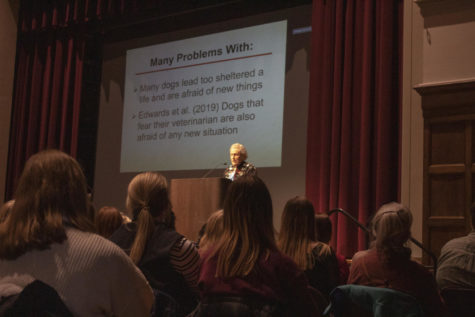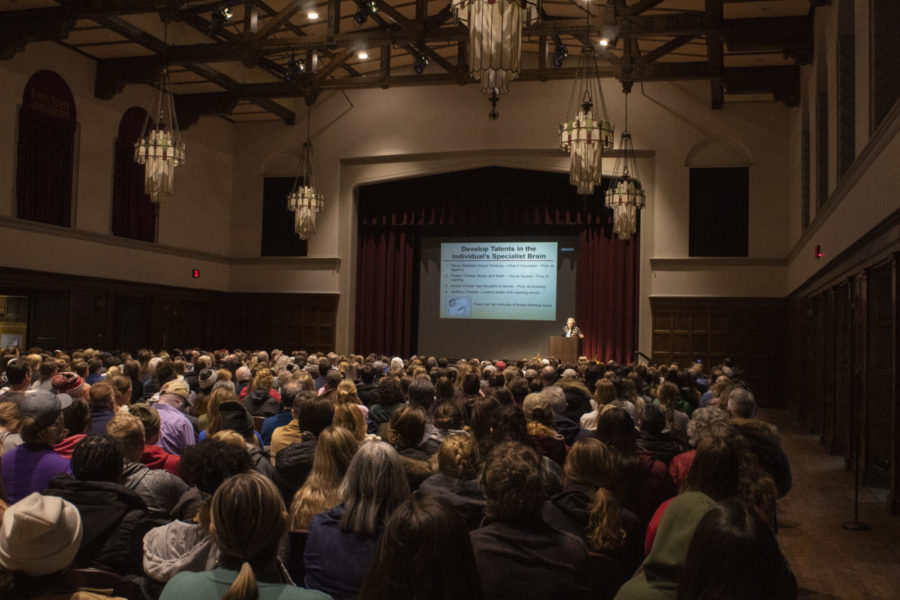Autism and animal expert dissects animal experiences
Many students gather to view the Let’s Talk About Pets lecture at the Memorial Union on Feb. 2.
An animal behaviorist and prominent author shared her story on how autism allows her to perceive the world the way animals do as a part of Iowa State’s Lectures Series.
Temple Grandin, an animal science professor at Colorado State University, presented her lecture Thursday night in the Great Hall of the Memorial Union.
“Animals live in a sensory-based world,” Grandin said. “You want to understand animals? You need to get away from language.”
Grandin compared the similarity in reactions between animals and people with autism when faced with sudden new experiences. Grandin said animals are only attracted to new objects or experiences when they can approach them on their own terms. When a new object or experience is being forced upon them, the only reaction will be fear, which could then lead to negative associations.
“Make it a good experience so that you can avoid a lot of dangerous situations in the future,” Grandin said.
Grandin said stockmanship, the science behind properly handling farm animals, is extremely important for caring for livestocks’ welfare.
Grandin said that specifically high-performance chickens are only high-functioning when everything within the system is done right. However, Grandin said this system also presents itself to be a system on the edge.
“I went to two barns with the same everything, and it looked super nice in one barn and horrid in the other,” Grandin said. “It turns out the only thing that was different was the source of the hatching eggs.”
Grandin used the phrase “bad becoming normal” when discussing the problems sprouted by extreme domestication, mentioning breathing difficulties prominently found in modern bulldogs.
“Preventing suffering isn’t enough,” Grandin said. “We’ve got to make sure the animal has a life worth living.”
Based on her recently published book “Visual Thinking,” Grandin said different minds can cooperate to fulfill different objectives. These different minds include visual thinkers, pattern thinkers, verbal thinkers, and auditory thinkers.
“A lot of people have mixtures of these, but you also get people that are some kind of extremes,” Grandin said.
Grandin said it was not until she turned 30 years old that she found out not everybody thought the way she did. Grandin said she was amazed when she realized that her speech therapist thought with words rather than images, unlike her.

“I’m an extreme visual thinker,” Grandin said. “I don’t narrate the words; words narrate pictures.”
Grandin also mentioned the good support system she received while in elementary school as a student with autism while battling through bullying in high school, which she said became fuel for her success later on.
When asked about her greatest accomplishment, Grandin said it was her success in implementing the audits conducted by McDonald’s, Wendy’s and Burger King in 1999 that greatly improved animal handling and stunning.
“In 1999, I saw more change than I’ve seen in my whole entire career,” Grandin said.
Jordan Sanders, a junior majoring in animal ecology, said as a pre-vet major she was interested in learning ways to reduce stress in animals.
“The takeaway messages I got were how important it is to understand how animals function and how their brains work,” Sanders said. “I also think that everything related to the animal welfare side is important– especially as someone who wants to work in veterinary medicine.”
Sanders said she was intrigued by the comment about rewarding dogs for not pulling their paws away when held. She said that strategy would help vet clinics with trimming dogs’ nails, as that is often the most stressful thing for dogs.
“I think Dr. Temple Grandin did a great job connecting her experiences with autism into how animals see the world in a sensory type of way,” Sanders said. “Having someone on campus with her knowledge and credibility was really cool.”
Savanna Basulto, a sophomore majoring in biology, said Grandin’s perspective on animals’ stress offers a great alternative to the analysis of data that some researchers rely on.
“I thought that the talk was very informative, especially when it came to [how] her own experience with autism allowed her to sympathize with animals but also show ways in which an animal views their world,” Basulto said. “This new perspective allows for us to really cater to them and make their lives as stress-free as possible.”
Basulto said one of her big takeaways from the lecture was understanding that not all creatures view the world in the same way.
“This can also be applied for those who are and aren’t neurotypical,” Basulto said. “It will always be in the interest of the animal/human when we can understand their viewpoint and cater to their needs.”
Your donation will support the student journalists of the Iowa State Daily. Your contribution will allow us to purchase equipment, send our student journalists to conferences and off-set their cost of living so they can continue to do best-in-the-nation work at the Iowa State Daily.











